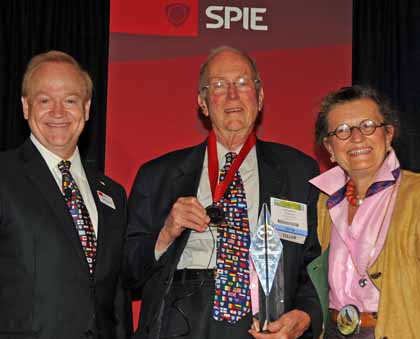Laser pioneer Charles Townes dies at 99
SPIE Newsroom
28 January 2015
Charles Hard Townes, a professor emeritus of physics at the University of California, Berkeley, who shared the 1964 Nobel Prize in Physics for invention of the laser and subsequently pioneered the use of lasers in astronomy, died on 27 January. He was 99.
Born 28 July 1915 in Greenville, SC, Townes attended Furman University and graduated summa cum laude in 1935 at the age of 19 with a BS in physics and a BA in modern languages. He completed an MA in physics at Duke University in 1936 and moved to Caltech, where he obtained his Ph.D. in 1939. His thesis involved isotope separation and nuclear spins.
Townes was 35 in the spring of 1951 when, seated on a park bench among blooming azaleas in Washington, DC, he was struck by the solution to a longstanding problem, how to create a pure beam of short-wavelength, high-frequency light.
That revelation -- not much different from a religious revelation, Townes believed -- eventually led to the first laser, a now ubiquitous device common in medicine, telecommunication, entertainment and science. Then a professor at Columbia University and a consultant for Bell Telephone Laboratories, Townes had transitioned from working on radar during World War II to using shorter wavelengths of light to study the energy states of molecules, a field called spectroscopy. The problem bedeviling him was how to create an intense beam of microwave energy to use as a probe.
Townes shared the 1964 Nobel Prize in Physics with Aleksandr M. Prokhorov and Nicolai G. Basov, who independently came up with the idea for a maser.
Full story -- In memoriam: Charles Townes, laser pioneer Nobel Laureate

Charles Townes receives the Gold Medal of the Society at the 2010 SPIE Awards Banquet. L-R 2010 SPIE President Ralph James, Charles Townes, 2011 SPIE President Katarina Svanberg.
